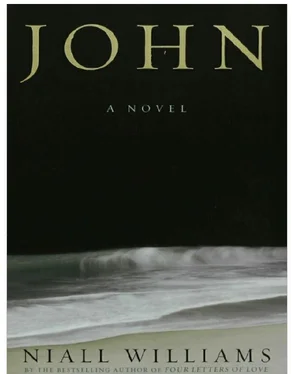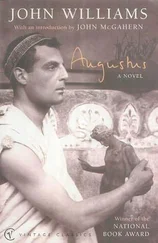Then nothing.
Then nothingness is.
Then all is made nothing.
It cannot be.
'Master! Master!' Papias calls. But the dark returns no answer.
They search a small circle, then Lemuel says, 'Beyond we cannot see. We must stop and await the dawn.'
'We cannot stop.'
'It is dangerous, Papias. We may all perish.'
'We must continue looking.'
'We can see nothing.'
'I would rather perish than stop.'
'We must be for one another. If he is gone, we are what remains. We must be of one voice.'
'He is not gone!' Papias cries. 'He has not left us!'
He turns from them and goes into the dark.
'Wait, Papias!' Lemuel says, and when the younger disciple pauses, tells him, 'We will all go. We will hold to each other, be bound like a vine.'
He offers his hand. Papias seems to hesitate in taking it, but does. Each takes the hand of another and they go forth over the ground slowly, calling for the one they have lost.
It is an hour.
Then another. Pink dawn fringes the horizon.
Then they find him. He is fallen between the earth and the world below, his hip and leg twisted, his head bloodied where it struck a rock. He has the stillness of death.
They rush to him. Papias cradles the beloved head.
There is breath. He lives still but is badly injured. He is too weak to speak.
None say a word. Their spirits are too busy with prayer.
With such tenderness as cannot be told, they bear him from the ground.
The house of Levi is undamaged. There the disciples return and lay the Apostle on layered bed mats and a goatskin cushion, the property of Levi. John is weak, speaks but little. Sometimes he says the word 'children', and Papias is unsure if he asks for the children of Martha or refers to the disciples. He drifts away in sleep. Martha is sent for and comes with a cousin, Ruth, to attend to him.
The disciples sit in an outer room, mute with shock. The quake, the Apostle's fall, seem redolent with meaning, but none want to translate it. They cannot deny how near John has come to death, and may die still, and how that thought moves all to a precipice. But they do not want to ask why, why such might happen, and why now. They cannot bear what seems to approach. Is it the will of God that John will die? And if it is, who are they to try to divert it? And yet divert it they would. Is the Apostle's work done? Is it to die from a fall in Ephesus that he has lived so long? Where comes Christ? Where is the revelation?
His hands knit, Papias rocks himself slightly back and forth as he prays. Lemuel's head is bowed, Danil's brow a furrowed field.
The women come and go from the Apostle with oils and ointments. He is bathed, his wounds cleaned. He lies three days while the house is filled in every corner with white birds of prayer.
On the fourth day Martha tells that he asks for them.
The disciples come into the room with the abashed timidity of men about an infant. John appears to all a changed figure. Is he more frail, or is it only the frailty of their hope that is more apparent to them now? His thin hair is combed away from his face; his beard runs to his chest.
Papias weeps to see him. He cannot stand a moment but rushes forwards and kneels by the bed and lays his head down by the Apostle's hand. It rises to comfort him.
'Weep not,' John says. 'All is as should be.'
'You are hurt, Master. You fell. I let you leave.'
'Be consoled, Papias.'
But poisons of guilt and loathing choke the disciple's spirit. In the terror of the quake his hands have touched them all; he may have passed disease to each, and death be quickening toward them. Christ must come. Christ must come now or Papias will have Killed them all. In spasms the fear and longing bursts from him. He weeps bitterly.
The hand of the Apostle is upon his head.
'Be consoled, Papias.'
John thanks them for their prayers. All wish to ask why he had walked from them, whither was he going? What purpose did he have? Did he go to encounter whom? What? In his blindness did he see something they did not? And if not, what did it mean? What meaning was in the earth splitting so? What is the meaning in catastrophe?
The questions remain unasked.
'There must be many hurt,' John says.
'We have not gone outside, Master. We have been worried here.'
Thought flickers in the pale face.
'You must go, all of you. Go and help who needs help. Be of good charity.' His tongue he touches to his lips. 'The God of patience and consolation be with you. Papias rise up. Be not afraid. May you all be like-minded to one another in love according to our Lord Jesus Christ. Go and be the glory of our Lord made manifest. My children, love not in word, neither in tongue, but in deed and in truth. Love, this is the commandment we have. Love. Go, and peace be to thee. Go.'
The Apostle's hand rises in salute and blessing and farewell.
None move away. Briefly they are affixed to the scene. For it is a moment before the world rights itself in their spirits. Is he returned to them then? Is all to be repaired? There is a difference felt but not yet understood. Some change has occurred, but the defining of it is to be left for later. Now they are each, in the core of their souls, consoled. It is as if into the solitary space of each spirit has come a companion.
This, companionship, the nature of consolation exactly. And of love.
The city has suffered worst in its poorer quarters. In the outskirts are narrow streets where cheap dwellings crowd. Some have fallen entire, a spillage appalling of stone and bodies. Furnishings, tables, beds, are broken, scattered into the street. Some buildings are one side fallen and gape aghast with strange, naked vulnerability. Now, the fourth day, there are still everywhere cries, wailing. Everywhere there are figures scrabbling at the dirt. The disciples part from one another and go amongst the people. The day is boiled hot, but no sun shines. Rather, an opaque skin covers the sky and makes bleary the air. No wind takes away the scent of death and destruction.
On the threshold stone from which her house has fallen away a woman sits lamenting. Danil goes to her.
In cavernous ruins where fire has taken a family, Lemuel finds two children. Eli and Meletios come to the aid of an aged tinsmith who has lost his wife. Husbands, uncles, cousins, grandmothers, wives, children, all are missing and prayed for. The disciples come amongst those whose hope is snapped like dry bread, who bewail the horror and cannot be spoken to of consolation. Instead, Danil and the others offer their presence. What skills they have are in quietude, and these are plentiful. They sit on the floor of those in mourning, listen to the pain of ones lost in the mystery of suffering. They are its witnesses.
It is practice that Papias finds at first most difficult. He wants to preach God's love. He wants to tell that Christ is coming, that they must just believe. But even he, too, comes to this understanding, that it is a time of silence and action. In one house a trader who has lost his father gives him salted fish for thanks; this Papias brings to another not far distant who starves. A scorched morning when the birds of prey wheel lower a woman rushes from a ruin, clutches at his robe. 'Help me, help me, my daughter.' She pulls him to an inner courtyard of stone and sand and broken timber. 'She lives. I know she lives!' she says. 'I hear her.'
'You hear her?'
'She doesn't stop calling. Listen. You can hear.'
Papias hears nothing. It is days since the quake. None can be living still.
'Help me. Please sir, help.'
Papias looks at her as at a memory. He looks away and throws himself into clawing free the rubble. The sun burns at his back. Beneath his robe he can feel the sores ooze. For an hour, two, he pulls away the collapsed building. He hears no sound of any child, only the woman sobbing prayers to all gods and any gods that will listen. Shreds of cloth, shards of vase, remnants of all manner, he pulls from the dust, then finds large stones that have crossed one another in falling. Beneath he hears a whimper.
Читать дальше










